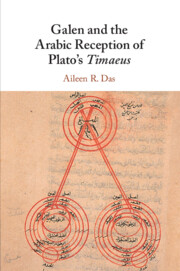
-
Select format
-
- Publisher:
- Cambridge University Press
- Publication date:
- October 2020
- November 2020
- ISBN:
- 9781108583107
- 9781108499484
- 9781108730730
- Dimensions:
- (228 x 152 mm)
- Weight & Pages:
- 0.8kg, 258 Pages
- Dimensions:
- (229 x 152 mm)
- Weight & Pages:
- 0.37kg, 258 Pages
You may already have access via personal or institutional login
Book description
This first full-length study of the Arabic reception of Plato's Timaeus considers the role of Galen of Pergamum (129–c. 216 CE) in shaping medieval perceptions of the text as transgressing disciplinary norms. It argues that Galen appealed to the entangled cosmological scheme of the dialogue, where different relations connect the body, soul, and cosmos, to expand the boundaries of medicine in his pursuit for epistemic authority – the right to define and explain natural reality. Aileen Das situates Galen's work on disciplinary boundaries in the context of medicine's ancient rivalry with philosophy, whose professionals were long seen as superior knowers of the cosmos vis-à-vis doctors. Her case studies show how Galen and four of the most important Christian, Muslim, and Jewish thinkers in the Arabic Middle Ages creatively interpreted key doctrines from the Timaeus to reimagine medicine and philosophy as well as their own intellectual identities.
Awards
Winner, 2021 Charles J. Goodwin Award of Merit, Society for Classical Studies
Contents
Metrics
Altmetric attention score
Full text views
Full text views help Loading metrics...
Loading metrics...
* Views captured on Cambridge Core between #date#. This data will be updated every 24 hours.
Usage data cannot currently be displayed.
Accessibility standard: Unknown
Why this information is here
This section outlines the accessibility features of this content - including support for screen readers, full keyboard navigation and high-contrast display options. This may not be relevant for you.
Accessibility Information
Accessibility compliance for the PDF of this book is currently unknown and may be updated in the future.


